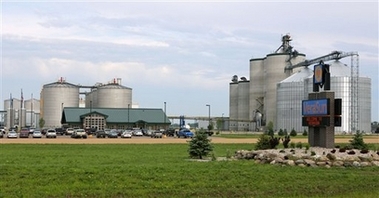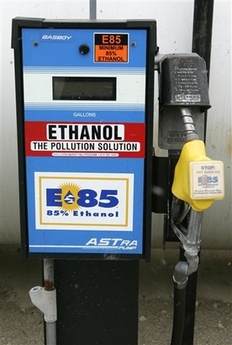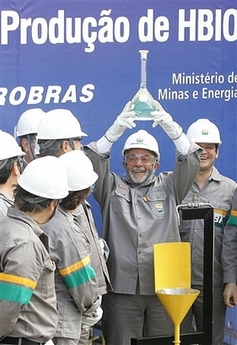What's more important here? The "green" of money, or the "green" of the environment? (ethanol)
 Demonstrators march in downtown Vienna, Wednesday, June 21, 2006, to protest a visit by U.S. President George W. Bush for a summit with European Union leaders. President Bush met with EU leaders for talks ranging from the Iran nuclear standoff to ways of reducing the West's foreign energy dependence. (AP Photo/Zoland Zak)
Demonstrators march in downtown Vienna, Wednesday, June 21, 2006, to protest a visit by U.S. President George W. Bush for a summit with European Union leaders. President Bush met with EU leaders for talks ranging from the Iran nuclear standoff to ways of reducing the West's foreign energy dependence. (AP Photo/Zoland Zak) Speaking of clear thinking about energy and driving, there is a need for some directness about ethanol as a replacement for gasoline.
It's not cost-efficient. It's not energy-efficient. It will take a lot of land, possibly forcing the importation of food. It's a big tax and federal credits give away to very large businesses such as ArcherDanielsMidland.
I don't know if this is related to "Rebuilding Place in the Urban Space," but it is related to logic in government and federal policy and the impact on the environment.
The Financial Times ran a number of articles last week on this issue, including a very long summary piece, "Elusive cornucopia: why it will be hard to reap the benefit of biofuel." This piece is not online, so I will quote the most important parts. From the article:
Wall Street is drunk on ethanol, pouring cash into constructing refineries and searching for any company that can claim a link to "green" fuels. Political leaders have been quick to offer their imprimatur. "Ethanol benefits a lot of folks," US President George W. Bush told an audience this year at Johnson Controls, a car parts supplier. "Most importantly it benefits people who are driving cars."
But strip away the hoopla and it becomes clear that the benefits of this investment, both for the environment and for energy security, are being wildly overstated -- because money is being poured into technologies likely to be outdated within a decade. Moreover, a big switch to biofuel with today's technology would only serve to replace US and European dependence either on foreign biofuels or foreign food....
Biofuels--ethanol and biodiesel--made from plants and animals have been given tax breaks, farmers growing them receive subsidies and exemptions from European production limits, while cars that run on them qualify for free parking in some cities....
So how sound is the rationale for all this activity? ... [W]hat is rarely highlighted is just how small the savings are in the US and Europe from using the current technology--and how much land is needed. It is difficult and expensive to convert food crops such as corn, wheat, sunflower, sugar beet or rapeseed...into fuel and requires intensive energy.
As a result, according to a study by Alexander Farrell of UC Berkeley and published in Science Magazine, today's ethanol production processes cut overall greenhouse gas emissions by only about 13% compared with petrol. In Brussels the [European] Commission has found that the standard production methods for sugar-beet ethanol in Europe reduced global warming emissions by a "modest" one-third compared with petrol. ...
 VeraSun Aurora, located near Aurora, S.D., is one of the largest dry-grind ethanol production facilities in the United States, producing approximately 120 million gallons per year, Friday June 16, 2006. VeraSun's successful IPO this week showed that investors are bullish on ethanol, but some analysts say the burgeoning industry faces long-term risks of oversupply and volatile commodity markets. (AP Photo/Eric Landwehr)
VeraSun Aurora, located near Aurora, S.D., is one of the largest dry-grind ethanol production facilities in the United States, producing approximately 120 million gallons per year, Friday June 16, 2006. VeraSun's successful IPO this week showed that investors are bullish on ethanol, but some analysts say the burgeoning industry faces long-term risks of oversupply and volatile commodity markets. (AP Photo/Eric Landwehr) Biofuels can save significantly on petrol, however, because the energy used to produce them comes mainly from coal and natural gas-fired power plants--important in the US, where the focus is on reducing oil use and the science behind global warming is still questioned. But the same plant sources that are used to make ethanol could more easily replace fuel oil, a heavy oil derivative, it they were burnt for heat. That would have the same energy security benefits at a much lower cost.
The advantages for drivers are also open to doubt. Because ethanol contains less energy than petrol, a "flex fuel" car able to run on E85 needs four gallons of ethanol to travel the same distance on three gallons of petrol. The cost of E85 thus needs to be significantly lower than it is to make sense on financial grounds alone...
Skeptics say the powerful farm lobby has hijacked the debate, helped by US automakers keen to deflect demands for greater fuel efficiency....
Richard Parry-Jones, chief technical officer at Ford, admits there is a danger that poorly structured tax breaks will lock in first-generation technology and deter investment in better production methods but says: "Let's not let the perfect be the enemy of the good." Evidence is increasing that poorly thought-out legislation and tax breaks are not only encouraging the current technology but its least effective versions. ...
 An E85 fuel pump is shown in a file photo from March 3, 2006, at the Ohio Department of Agriculture in Columbus, Ohio. VeraSun's successful IPO this week showed that investors are bullish on ethanol, but some analysts say the burgeoning industry faces long-term risks of oversupply and volatile commodity markets. (AP Photo/Kiichiro Sato, File)
An E85 fuel pump is shown in a file photo from March 3, 2006, at the Ohio Department of Agriculture in Columbus, Ohio. VeraSun's successful IPO this week showed that investors are bullish on ethanol, but some analysts say the burgeoning industry faces long-term risks of oversupply and volatile commodity markets. (AP Photo/Kiichiro Sato, File)To power one in 10 of America's cars with home-grown corn-based ethanol...would require almost one-third of US farmland, although other estimates vary significantly. ...
Because second-generation methods use waste plant material, they also hold out the potential to replace far more oil than is possible with current methods...
The article concludes:
In principle, biofuels should provide a clean, green alternative to oil that could help break Opec's control of the world's fuel supply. Tropical regions should be able to grow fuel for a large part of the world's cars, with less sultry areas such as Europe and the US joining in when the technology is fully developed. Yet, as with so much else involving farmers and world trade, this appears the least likely outcome.
______
The New York Times article "Mountains of Corn and a Sea of Farm Subsidies," discusses the politics of U.S. ethanol production.
Other FT articles from the week include "BP and Dupont near biofuel production breakthrough" (Wednesday) which stated that "the new product, biobutanol produces more energy than ethanol and does not require engines to be modified." ... "Whereas ethanol produces only about three-quarters of the energy of convention petrol when burned, biobutanol, which is also produced from sugar, could produce as much as 95%."
And Brazil has developed "H-Bio," a hybrid diesel-vegetable oil fuel that "puts Brazil at the forefront of the development of green, alternative fuels" according to "Brazil breakthrough plants idea of growing fuel oils in the fields" in the Friday FT.
 In this photo released by Agencia Brasil, Brazilian President Luiz Inacio Lula da Silva holds the new H-Bio fuel at a Petrobras refinery in Curitiba, 415 miles (670 kms) southwest of Rio de Janeiro, Brazil, on Tuesday, June 20, 2006. Brazil has developed a new diesel fuel mixed with vegetable oils that will sharply reduce its need for imported diesel, the state-run oil company Petroleo Brasileiro SA, or Petrobras, said Tuesday. Lula da Silva said the new fuel represented a 'revolution of tremendous magnitude for the 21st century,' when Petrobras presented the fuel in Curitiba, 415 miles (670 kms) southwest of Rio. (AP Photo/AGENCIA BRASIL, Domingos Tadeu)
In this photo released by Agencia Brasil, Brazilian President Luiz Inacio Lula da Silva holds the new H-Bio fuel at a Petrobras refinery in Curitiba, 415 miles (670 kms) southwest of Rio de Janeiro, Brazil, on Tuesday, June 20, 2006. Brazil has developed a new diesel fuel mixed with vegetable oils that will sharply reduce its need for imported diesel, the state-run oil company Petroleo Brasileiro SA, or Petrobras, said Tuesday. Lula da Silva said the new fuel represented a 'revolution of tremendous magnitude for the 21st century,' when Petrobras presented the fuel in Curitiba, 415 miles (670 kms) southwest of Rio. (AP Photo/AGENCIA BRASIL, Domingos Tadeu)When the oil and automobile manufacturing industries control your "energy research" program, perhaps it is to be expected that the U.S. isn't necessarily leading the forefront of research into new products and technologies.
The article "Wind changes in favour of biofuels" from the Tuesday FT covers the boom in investor interest in the ethanol production industry. A chart of manufacturer capacity points out that Archer Daniels Midland controls 37% of the industry (Cargill has 4%). For more information about the agriculture commodities industry, the book Merchants of Grain is a good place to start.
Index Keywords: energy; agriculture



0 Comments:
Post a Comment
<< Home